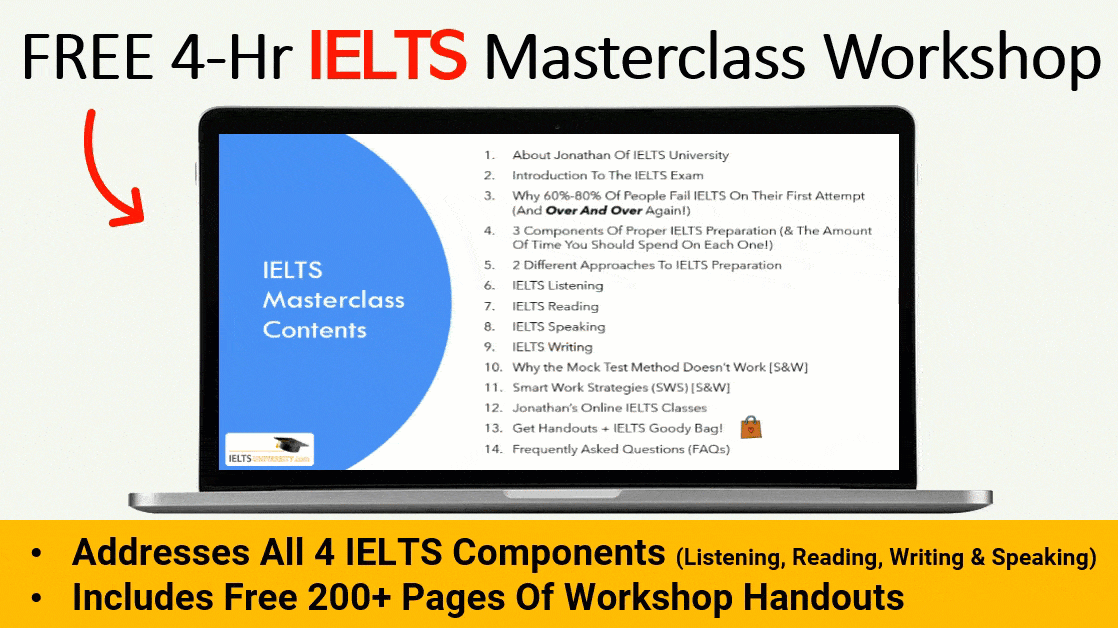IELTS (International English Language Testing System) is a globally recognized English language proficiency test that assesses the language skills of non-native English speakers. It is accepted by more than 10,000 organizations in over 140 countries, including universities, employers, and immigration authorities. Singapore, being a hub of international students and professionals, offers a wide range of IELTS preparation courses and materials to help test-takers achieve their desired scores.

Understanding the IELTS Exam Structure is crucial for test-takers to prepare effectively. The exam consists of four sections – Listening, Reading, Writing, and Speaking – each designed to evaluate different language skills. Identifying the Best IELTS Preparation Centers in Singapore is a crucial step in the preparation process. These centers provide comprehensive training and guidance to students, including mock tests, personalized feedback, and study materials, to help them achieve their desired scores.
Key Takeaways
- Understanding the IELTS Exam Structure is crucial for effective preparation.
- Identifying the Best IELTS Preparation Centers in Singapore can greatly enhance a student’s chances of success.
- Enrolling in an IELTS preparation course and utilizing study materials can significantly improve test-takers’ scores.
Understanding the IELTS Exam Structure

The International English Language Testing System (IELTS) is a standardized test that assesses the English language proficiency of non-native English speakers. The exam is divided into four sections: Listening, Reading, Writing, and Speaking. Each section is designed to test different language skills, and the exam takes 2 hours and 45 minutes to complete.
Listening Section
The Listening section consists of four parts, and it lasts for 30 minutes. The test taker will listen to a recording of a conversation or monologue and answer questions related to it. The recordings are played only once, and the test taker must answer the questions while listening to the recording.
Reading Section
The Reading section consists of three parts, and it lasts for 60 minutes. The test taker will read three passages and answer questions related to them. The passages are taken from academic texts, and the questions are designed to test the test taker’s ability to understand and analyze the information presented in the passages.
Writing Section
The Writing section consists of two tasks, and it lasts for 60 minutes. In Task 1, the test taker must describe a graph, chart, or diagram in their own words. In Task 2, the test taker must write an essay on a given topic. The test taker is expected to demonstrate their ability to organize and present their ideas in a clear and coherent manner.
Speaking Section
The Speaking section consists of three parts, and it lasts for 11-14 minutes. The test taker will have a conversation with an examiner on a range of topics. The test taker is expected to demonstrate their ability to express their opinions, ideas, and experiences fluently and coherently.
Overall, the IELTS exam structure is designed to test the test taker’s ability to use English in an academic or professional context. By understanding the structure of the exam, test takers can prepare more effectively and increase their chances of success.
Identifying the Best IELTS Preparation Centers in Singapore
When it comes to preparing for the IELTS exam, selecting the right preparation center is crucial. Singapore has many IELTS preparation centers, but not all are equal in terms of quality and effectiveness. In this section, we will discuss the criteria for selecting the best IELTS preparation centers in Singapore and highlight some of the top-rated centers.
Criteria for Selection
There are several factors that one should consider when selecting an IELTS preparation center in Singapore:
- Quality of Instructors: The quality of instructors is perhaps the most important factor to consider. Look for centers that have experienced instructors with a proven track record of success.
- Course Content: The course content should be comprehensive and cover all aspects of the IELTS exam. It should include practice tests, mock exams, and feedback on performance.
- Flexibility: The center should offer flexible schedules and allow students to choose the timings and duration of their classes.
- Location: The center should be conveniently located and easily accessible.
- Reviews and Feedback: Look for centers that have positive reviews and feedback from previous students.
Top-Rated Centers
Here are some of the top-rated IELTS preparation centers in Singapore:
- British Council Singapore: The British Council is one of the most reputable organizations for IELTS preparation. They offer a range of courses and resources, including online courses, one-to-one coaching, and mock exams.
- IDP Education Singapore: IDP Education is another well-known organization that offers IELTS preparation courses. They have experienced instructors and a comprehensive course curriculum.
- Lingo School of Knowledge: Lingo School of Knowledge is a top-rated IELTS preparation center in Singapore. They offer flexible schedules and personalized coaching to help students achieve their desired scores.
- Kaplan Singapore: Kaplan Singapore is a popular choice for IELTS preparation. They offer a range of courses and resources, including classroom-based courses, online courses, and private tutoring.
- Elite Linguistic Network: Elite Linguistic Network is a boutique IELTS preparation center in Singapore. They offer personalized coaching and small class sizes to ensure that students receive individual attention.
In conclusion, selecting the right IELTS preparation center in Singapore is essential for success in the exam. By considering the criteria mentioned above and exploring the top-rated centers, students can make an informed decision and maximize their chances of achieving their desired scores.
Enrollment Procedures for IELTS Coaching

Enrolling in an IELTS coaching program in Singapore is a straightforward process. Most coaching centers offer online and offline registration options, and students can choose the one that suits them best.
To enroll in an IELTS coaching program, students need to provide their personal details, such as name, contact information, and identification documents. They also need to provide their IELTS score, if available, to help the coaching center assess their proficiency level.
Once the registration is complete, students are required to pay the course fee. The fee varies depending on the coaching center, the duration of the program, and the type of coaching (online or offline). Some coaching centers offer discounts or installment plans to help students manage the cost of the program.
After completing the enrollment process, students will receive a schedule of classes and study materials. The coaching center will also assign them a mentor who will guide them throughout the program.
It is important to note that students should enroll in an IELTS coaching program that suits their needs and proficiency level. They should also ensure that the coaching center is reputable and has a good track record of helping students achieve their desired IELTS score.
In summary, enrolling in an IELTS coaching program in Singapore is a simple process that requires personal details, IELTS score (if available), and payment of the course fee. Students should choose a reputable coaching center that suits their needs and proficiency level to maximize their chances of success.
Overview of IELTS Study Materials

When it comes to preparing for the IELTS exam in Singapore, there are a variety of study materials available to choose from. This section will provide an overview of the most popular study materials, including official guides, practice tests, and online resources.
Official Guides
The official IELTS guides are considered to be the most reliable and comprehensive study materials available. These guides are created by the test makers themselves and provide detailed information about the exam format, question types, and scoring system. They also include sample questions and answers, as well as helpful tips and strategies for test-taking.
Practice Tests
Practice tests are an essential part of any IELTS preparation plan. They allow test-takers to simulate the exam experience and get a sense of their strengths and weaknesses. There are many different types of practice tests available, including full-length tests, section-specific tests, and timed tests. Some practice tests also come with answer keys and explanations, which can be helpful for self-study.
Online Resources
In recent years, there has been a surge in online resources for IELTS preparation. These include websites, blogs, forums, and social media groups dedicated to IELTS study. Many of these resources offer free practice materials, study tips, and advice from experienced test-takers. However, it is important to be cautious when using online resources, as not all of them are reliable or accurate.
Overall, choosing the right study materials for IELTS preparation in Singapore can be a daunting task. However, by using a combination of official guides, practice tests, and online resources, test-takers can feel confident and well-prepared on exam day.
Strategies for IELTS Listening Section

The IELTS Listening section is designed to test a candidate’s ability to understand spoken English in a variety of contexts. It is important to have a good strategy in place to perform well in this section. Here are some strategies that can be useful:
1. Familiarize yourself with different accents
The IELTS Listening section contains a range of accents from different English-speaking countries. It is important to expose yourself to different accents to improve your listening skills. You can watch English movies, TV shows, or listen to English podcasts to get used to different accents.
2. Listen actively
Active listening is key to performing well in the IELTS Listening section. It involves paying attention to the speaker, taking notes, and predicting what the speaker might say next. This helps you to focus on the conversation and pick up important details.
3. Use contextual clues
Contextual clues are hints that help you understand the meaning of a word or phrase. In the IELTS Listening section, you can use contextual clues such as the topic of the conversation, the speaker’s tone, and body language to understand what is being said.
4. Practice with sample tests
Practicing with sample tests is a great way to prepare for the IELTS Listening section. It helps you to familiarize yourself with the format of the test, the types of questions, and the time limit. You can find sample tests online or in IELTS preparation books.
5. Improve your vocabulary
Having a good vocabulary is essential for understanding spoken English. You can improve your vocabulary by reading English books, newspapers, and magazines. You can also use flashcards or apps to learn new words.
By following these strategies, candidates can improve their performance in the IELTS Listening section. It is important to practice regularly and stay focused during the test to achieve a good score.
Techniques for IELTS Reading Section

The IELTS Reading section assesses a candidate’s ability to read and comprehend written texts in English. To score well in this section, candidates need to develop certain techniques that can help them quickly understand the given text. Here are some useful techniques for the IELTS Reading section:
Skimming and Scanning
Skimming and scanning are two important techniques that can help candidates quickly understand the context of the given text. Skimming involves reading the text quickly to get a general idea of what it is about. Scanning involves quickly looking through the text to find specific information.
Time Management
Time management is crucial in the IELTS Reading section. Candidates need to manage their time effectively to answer all the questions within the given time limit. They should allocate time for each section and stick to it. Candidates should also avoid spending too much time on difficult questions and move on to the next one.
Understanding Question Types
Candidates should be familiar with the different types of questions that can be asked in the IELTS Reading section. These include multiple-choice, matching, sentence completion, and summary completion questions. Understanding the question types can help candidates quickly identify the information they need to answer the questions.
Vocabulary
Having a good vocabulary is essential for scoring well in the IELTS Reading section. Candidates should learn new words and their meanings to understand the text better. They should also practice using context clues to understand the meaning of unfamiliar words.
Practice
Practice is the key to success in the IELTS Reading section. Candidates should practice reading different types of texts and answering questions to improve their reading skills. They should also take mock tests to get familiar with the format of the IELTS Reading section and manage their time effectively.
By using these techniques, candidates can improve their performance in the IELTS Reading section and achieve their desired score.
Improving Skills for IELTS Writing Section

To excel in the IELTS Writing section, it is crucial to have strong writing skills and a good understanding of the test format. Here are some tips to help improve your skills for the IELTS Writing section:
1. Understand the Task Types
It is essential to have a clear understanding of the different task types in the IELTS Writing section. There are two tasks: Task 1 and Task 2. Task 1 requires test-takers to describe, summarize, or explain visual information, while Task 2 requires test-takers to write an essay in response to a prompt. Understanding the task types will help test-takers to prepare and plan their responses effectively.
2. Practice Writing Regularly
Regular practice is key to improving writing skills for the IELTS Writing section. Test-takers should aim to write at least one essay or task response every day. This will help them to develop their writing skills, build their vocabulary, and improve their grammar and sentence structure.
3. Read and Analyze Sample Essays
Reading and analyzing sample essays can help test-takers to understand the structure and format of a well-written essay. They can also learn new vocabulary and sentence structures that they can use in their own writing. Test-takers should aim to read a variety of sample essays, including those that have received high scores as well as those that have received low scores.
4. Use Formal Language
The IELTS Writing section requires test-takers to use formal language. Test-takers should avoid using slang, contractions, and informal language in their writing. Instead, they should use formal vocabulary and sentence structures to convey their ideas clearly and effectively.
5. Manage Time Effectively
Time management is crucial in the IELTS Writing section. Test-takers should aim to spend no more than 20 minutes on Task 1 and 40 minutes on Task 2. They should also allocate time for planning, writing, and reviewing their responses. Practicing time management skills can help test-takers to complete the tasks within the allotted time and avoid rushing through their responses.
By following these tips, test-takers can improve their writing skills for the IELTS Writing section and increase their chances of achieving a high score.
Tips for IELTS Speaking Section

The IELTS Speaking section is a crucial part of the IELTS exam, and it can be daunting for many test-takers. However, with the right preparation and practice, anyone can improve their speaking skills and achieve a high score. Here are some tips to help you prepare for the IELTS Speaking section:
1. Familiarize yourself with the format
Before you start preparing for the IELTS Speaking section, it’s important to understand the format of the exam. The Speaking section consists of three parts, and each part has a specific focus. Part 1 is an introduction and interview, Part 2 is a short speech, and Part 3 is a discussion. Understanding the format will help you know what to expect and prepare accordingly.
2. Expand your vocabulary
Having a wide range of vocabulary is essential for the IELTS Speaking section. Test-takers should focus on learning new words and phrases related to common topics such as family, work, education, and travel. Using synonyms and idiomatic expressions can also help to impress the examiner.
3. Practice speaking in English
The more you practice speaking in English, the more comfortable you will become with the language. Practice speaking with friends, family, or a tutor, and try to speak for longer periods without pausing or hesitating. This will help you to develop fluency and coherence.
4. Listen to English speakers
Listening to native English speakers can help you to improve your pronunciation, intonation, and accent. Watch English movies, TV shows, or listen to English podcasts. This will help you to get used to the different accents and styles of English.
5. Take mock tests
Taking mock tests is an excellent way to prepare for the IELTS Speaking section. Mock tests can help you to identify your weaknesses and strengths, and you can work on improving your weak areas. It’s also a great way to get used to the time limit and the pressure of the exam.
By following these tips, test-takers can improve their speaking skills and achieve a high score on the IELTS Speaking section. Remember to practice regularly, expand your vocabulary, and familiarize yourself with the format of the exam.
IELTS Test-Taking Strategies

Time Management
One of the most important strategies for succeeding in the IELTS test is effective time management. Test-takers should allocate their time wisely, ensuring that they have enough time to answer all the questions in each section. It is recommended that candidates spend no more than 20 minutes on each section of the Listening test and no more than 60 minutes on each section of the Reading test. For the Writing test, candidates should spend approximately 20 minutes on Task 1 and 40 minutes on Task 2. In the Speaking test, candidates should aim to speak for the entire two minutes for each question.
Answering Techniques
Another important strategy for success in the IELTS test is to use effective answering techniques. In the Listening and Reading tests, candidates should read the questions carefully before listening or reading the passage. This will help them to identify the relevant information more quickly and accurately. In the Writing test, candidates should ensure that they understand the task and the requirements before beginning to write. They should also use appropriate grammar and vocabulary to convey their ideas clearly. In the Speaking test, candidates should listen carefully to the examiner’s questions and answer them fully and clearly, using appropriate grammar and vocabulary.
Common Mistakes to Avoid
There are several common mistakes that candidates should avoid when taking the IELTS test. These include failing to read the instructions carefully, not managing time effectively, not answering all the questions, using inappropriate grammar and vocabulary, and not practicing enough before the test. Candidates should also avoid memorizing answers or using pre-written essays in the Writing test, as this will result in a lower score. It is important to remember that the IELTS test is designed to assess a candidate’s ability to communicate effectively in English, and therefore, candidates should focus on developing their language skills through regular practice and study.
Overall, by using effective time management, answering techniques, and avoiding common mistakes, candidates can improve their chances of success in the IELTS test.
Managing Test Day and Post-Test Procedures

Preparing for the IELTS test day is just as important as studying for it. Here are some tips to help manage test day and post-test procedures in Singapore:
Test Day Procedures
- Arrive early: Candidates should aim to arrive at the test center at least 30 minutes before the scheduled start time. This allows time for check-in procedures and to settle any nerves.
- Bring required documents: Candidates must bring their original passport or national identity card, as well as their test confirmation email or letter. Failure to bring these documents may result in the candidate being unable to take the test.
- Dress comfortably: The test center may be air-conditioned, so it is advisable to dress in layers to avoid discomfort during the test.
- Listen carefully to instructions: The test supervisor will provide instructions on how to complete the test. Candidates should listen carefully and ask any questions they may have before the test begins.
Post-Test Procedures
- Collect score report: Candidates will receive their IELTS score report via email or post, depending on their preference. It is important to ensure that the correct contact details are provided at the time of registration.
- Verify scores: Candidates should check that their scores are correct and report any discrepancies to the test center within six weeks of the test date.
- Send score reports: Candidates can request that their scores be sent to institutions such as universities or employers. This can be done up to two years after the test date.
- Retake the test if necessary: If a candidate is not satisfied with their score, they can retake the test. However, it is important to note that there is a waiting period of 90 days before a candidate can retake the test.
By following these procedures, candidates can ensure a smooth test day and post-test experience.
Continual Learning and IELTS Resources

To achieve a high score on the IELTS exam, continual learning and access to reliable resources are essential. In Singapore, there are several options available for individuals seeking to improve their language skills and prepare for the exam.
One of the most popular options is enrolling in an IELTS preparation course. These courses are designed to provide students with the necessary skills and strategies to excel on the exam. They cover all four sections of the exam – reading, writing, speaking, and listening – and provide ample opportunity for practice and feedback.
In addition to courses, there are also a variety of online resources available. The official IELTS website offers free practice materials, including sample questions and answers, as well as tips and advice for test-takers. Other websites, such as IELTS Liz and IELTS Advantage, offer comprehensive study guides, practice tests, and video tutorials.
For those who prefer more personalized attention, private tutoring is also an option. Many language schools and independent tutors offer one-on-one sessions tailored to the individual needs of the student. This can be particularly helpful for those who struggle with specific aspects of the exam, such as pronunciation or grammar.
No matter what method of preparation one chooses, it is important to stay motivated and committed to continual learning. Consistent practice and exposure to the English language through reading, listening, and speaking will not only improve one’s chances of success on the IELTS exam but also enhance their overall language proficiency.
Frequently Asked Questions
What are the typical fees for IELTS courses in Singapore?
The fees for IELTS courses in Singapore vary depending on the institution and the duration of the course. Typically, the fees range from SGD 500 to SGD 2000. It is advisable to research and compare the fees of various institutions before enrolling in a course.
Can I find free IELTS preparation resources in Singapore?
Yes, there are several free IELTS preparation resources available in Singapore. The British Council and IDP Education offer free online practice tests and sample questions. Additionally, there are several websites and YouTube channels that offer free IELTS preparation materials.
Which institutions offer the best IELTS preparation courses in Singapore?
There are several institutions in Singapore that offer IELTS preparation courses. Some of the top institutions include the British Council, IDP Education, Kaplan, and Inlingua. It is recommended to research and compare the course offerings, fees, and reviews of these institutions before enrolling in a course.
Are there any part-time IELTS courses available in Singapore?
Yes, there are several part-time IELTS courses available in Singapore. Institutions such as Kaplan and Inlingua offer part-time courses that cater to individuals with busy schedules. It is recommended to research and compare the course offerings and fees of various institutions before enrolling in a course.
Is a three-month duration sufficient to prepare for the IELTS exam?
The duration required to prepare for the IELTS exam varies depending on the individual’s proficiency in English. However, a three-month duration is generally considered sufficient for individuals with intermediate to advanced levels of English proficiency. It is recommended to assess one’s proficiency level and plan the duration of preparation accordingly.
What minimum score is required to pass the IELTS in Singapore?
The minimum score required to pass the IELTS in Singapore varies depending on the institution and the purpose of taking the exam. Generally, a minimum score of 6.0 is required for academic purposes, while a minimum score of 5.5 is required for general purposes. It is recommended to check the specific requirements of the institution or organization that requires the IELTS score.

